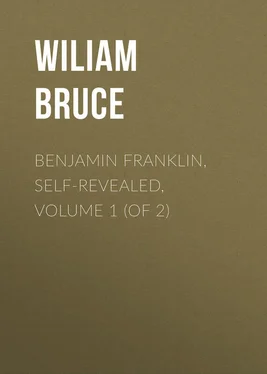Wiliam Bruce - Benjamin Franklin, Self-Revealed, Volume 1 (of 2)
Здесь есть возможность читать онлайн «Wiliam Bruce - Benjamin Franklin, Self-Revealed, Volume 1 (of 2)» — ознакомительный отрывок электронной книги совершенно бесплатно, а после прочтения отрывка купить полную версию. В некоторых случаях можно слушать аудио, скачать через торрент в формате fb2 и присутствует краткое содержание. Жанр: foreign_antique, foreign_prose, на английском языке. Описание произведения, (предисловие) а так же отзывы посетителей доступны на портале библиотеки ЛибКат.
- Название:Benjamin Franklin, Self-Revealed, Volume 1 (of 2)
- Автор:
- Жанр:
- Год:неизвестен
- ISBN:нет данных
- Рейтинг книги:5 / 5. Голосов: 1
-
Избранное:Добавить в избранное
- Отзывы:
-
Ваша оценка:
- 100
- 1
- 2
- 3
- 4
- 5
Benjamin Franklin, Self-Revealed, Volume 1 (of 2): краткое содержание, описание и аннотация
Предлагаем к чтению аннотацию, описание, краткое содержание или предисловие (зависит от того, что написал сам автор книги «Benjamin Franklin, Self-Revealed, Volume 1 (of 2)»). Если вы не нашли необходимую информацию о книге — напишите в комментариях, мы постараемся отыскать её.
Benjamin Franklin, Self-Revealed, Volume 1 (of 2) — читать онлайн ознакомительный отрывок
Ниже представлен текст книги, разбитый по страницам. Система сохранения места последней прочитанной страницы, позволяет с удобством читать онлайн бесплатно книгу «Benjamin Franklin, Self-Revealed, Volume 1 (of 2)», без необходимости каждый раз заново искать на чём Вы остановились. Поставьте закладку, и сможете в любой момент перейти на страницу, на которой закончили чтение.
Интервал:
Закладка:
Perhaps, however, in none of Franklin's writings is his mental attitude towards religious sects and their varied creeds and organizations disclosed with such bland insouciance and delicate raillery as in his letter to Mason Weems and Edward Gantt. Weems was the famous parson Weems whose legendary story of the cherry tree and the hatchet made for many years such a sublime enfant terrible of Washington, and Gantt was a native of Maryland who was destined in the course of time to become a chaplain of the United States Senate. In this letter, after acknowledging a letter from Weems and Gantt telling him that the Archbishop of Canterbury would not permit them to be ordained, unless they took the oath of allegiance, he says that he had obtained an opinion from a clergyman of his acquaintance in Paris that they could not be ordained there, or that, if they were, they would be required to vow obedience to the Archbishop of Paris. He next inquired of the Pope's Nuncio whether they might not be ordained by the Catholic Bishop in America, but received the answer that the thing was impossible unless the gentlemen became Catholics. Then, after a deprecatory statement that the affair was one of which he knew very little, and that he might therefore ask questions or propose means that were improper or impracticable, he pointedly adds: "But what is the necessity of your being connected with the Church of England? Would it not be as well, if you were of the Church of Ireland?" The religion was the same, though there was a different set of Bishops and Archbishops and perhaps the Bishop of Derry, who was a man of liberal sentiments, might give them orders as of the Irish Church. If both Britain and Ireland refused them (and he was not sure that the Bishops of Denmark or Sweden would ordain them unless they became Lutherans), then, in his humble opinion, next to becoming Presbyterians, the Episcopal Clergy of America could not do better than follow the example of the first Clergy of Scotland, who, when a similar difficulty arose, assembled in the Cathedral, and the Mitre, Crosier and Robes of a Bishop being laid upon the Altar, after earnest prayers for direction in their choice, elected one of their own number; when the King said to him: " Arise, go to the Altar, and receive your Office at the Hand of God. " If the British Isles were sunk in the sea, he continued (and the surface of the Globe had suffered greater changes), his correspondents would probably take some such method as this, and persistence in the denial of ordination to them by the English Church came to the same thing. A hundred years later, when people were more enlightened, it would be wondered at that men in America, qualified by their learning and piety to pray for, and instruct, their neighbors, should not be permitted to do it until they had made a voyage of six thousand miles out and home to ask leave of a cross old gentleman at Canterbury who seemed, by the account of his correspondents, to have as little regard for the souls of the People of Maryland as King William's Attorney-General Seymour had for those of the People of Virginia, when, in reply to the reminder of the Reverend Commissary Blair of William and Mary College that the latter had souls to be saved as well as the People of England, he exclaimed: " Souls! damn your Souls. Make Tobacco."
Here we have Franklin absolutely in puris naturalibus as respects the sacerdotal side of Religion, lavishing upon his correspondents in a single letter a series of half-serious, half-mocking sentiments flavored with some of his best intellectual qualities, and doubtless leaving them in a teasing state of uncertainty as to whether he intended to ridicule them or not. In the light of such a letter as this, the reader will hardly be surprised to learn that he did not quit the world until he had put on record his high opinion of heretics. After asking Benjamin Vaughan in one of his letters about a year and a half before his death, to remember him affectionately to the "honest" heretic, Doctor Priestley, he said:
I do not call him honest by way of distinction; for I think all the heretics I have known have been virtuous men. They have the virtue of fortitude, or they would not venture to own their heresy; and they cannot afford to be deficient in any of the other virtues, as that would give advantage to their many enemies; and they have not, like orthodox sinners, such a number of friends to excuse or justify them.
Holding these views about heretics, it is natural that Franklin should at times have stigmatized religious bigotry as it deserved. In his Remarks on a Late Protest , when he was being assailed for one of the most creditable acts of his life, his unsparing denunciation of the murder of hapless Indians by the Paxton Boys, he had a fearless word to say about "those religious Bigots, who are of all Savages the most brutish." And it would be difficult to find a terser or more graphic picture of religious discord than this in one of his letters to Jane Mecom:
Each party abuses the other; the profane and the infidel believe both sides, and enjoy the fray; the reputation of religion in general suffers, and its enemies are ready to say, not what was said in the primitive times, Behold how these Christians love one another, – but, Mark how these Christians hate one another! Indeed, when religious people quarrel about religion or hungry people about their victuals, it looks as if they had not much of either among them.
Not only did Franklin have no sympathy with sects and their jarring pretensions but he had little patience with either doctrinal theology or ecclesiastical rites and forms of any sort. Even after he decided to keep away from public worship on Sundays, he still retained [he said], a sense of its utility, when rightly conducted, and continued to pay regularly his annual subscription to the Presbyterian Church in Philadelphia which he had attended. Later, he was induced by its pastor to sit now and then under his ministrations; once he states, as if with a slight elevation of the eyebrows, for five Sundays successively, but it all proved unedifying, since not a single moral principle was inculcated or enforced; the aim of the preacher seeming to be rather to make them good Presbyterians than good citizens. At length the devout man took for his text the following verse from the fourth chapter of the Philippians: "Finally, brethren, whatsoever things are true, honest, just, pure, lovely or of good report, if there be any virtue, or any praise, think on these things." Now, thought Franklin, in a sermon on such a text we cannot miss of having some of the "morality" which was to him the entire meat of religion. But the text, promising as it was, had been subjected to such merciless dessication that it resolved itself into five points only "as meant by the apostle, viz.: 1. Keeping holy the Sabbath day. 2. Being diligent in reading the holy Scriptures. 3. Attending duly the publick worship. 4. Partaking of the Sacrament. 5. Paying a due respect to God's ministers." Franklin was disgusted, gave this preacher up entirely, and returned to the use of the Articles of Belief and Acts of Religion which he had previously composed for his own private devotions. Subsequently, however, he was again enticed to church by the arrival in Philadelphia from Ireland of a young Presbyterian minister, named Hemphill, who preached good works rather than dogma in excellent discourses, apparently extemporaneous, and set off with an attractive voice. This minister was soon formally arraigned for heterodoxy by the old orthodox clergy who were in the habit of paying more attention to Presbyterian doctrine than Franklin was, and found a powerful champion in Franklin, who, seeing that Hemphill, while an "elegant preacher," was, for reasons that afterwards became only too patent, a poor writer, wrote several pamphlets and an article in the Pennsylvania Gazette in his behalf. Unfortunately, when the war of words was at its height, Hemphill, who afterwards confessed to Franklin that none of the sermons that he preached were of his own composition, was proved to have purloined a part, at any rate, of one of his sermons from Dr. Foster, of whom Pope had written,
Читать дальшеИнтервал:
Закладка:
Похожие книги на «Benjamin Franklin, Self-Revealed, Volume 1 (of 2)»
Представляем Вашему вниманию похожие книги на «Benjamin Franklin, Self-Revealed, Volume 1 (of 2)» списком для выбора. Мы отобрали схожую по названию и смыслу литературу в надежде предоставить читателям больше вариантов отыскать новые, интересные, ещё непрочитанные произведения.
Обсуждение, отзывы о книге «Benjamin Franklin, Self-Revealed, Volume 1 (of 2)» и просто собственные мнения читателей. Оставьте ваши комментарии, напишите, что Вы думаете о произведении, его смысле или главных героях. Укажите что конкретно понравилось, а что нет, и почему Вы так считаете.










![Benjamin Franklin - Memoirs of Benjamin Franklin; Written by Himself. [Vol. 2 of 2]](/books/747975/benjamin-franklin-memoirs-of-benjamin-franklin-wr-thumb.webp)
![Benjamin Franklin - Memoirs of Benjamin Franklin; Written by Himself. [Vol. 1 of 2]](/books/748053/benjamin-franklin-memoirs-of-benjamin-franklin-wr-thumb.webp)
